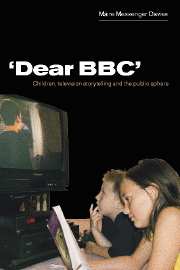Book contents
Conclusion: children and television drama – narrative closure?
Published online by Cambridge University Press: 12 October 2009
Summary
I think it [the questionnaire] is great. Thank you for bringing it in.
Boy, 8, inner-London primary schoolThe research described in this book began in 1995, with representatives of the BBC's Policy and Planning Department asking me to carry out some empirical research for the Corporation on children and television drama, from my then base at the London College of Printing.As with other media and academic projects, both the research, and the Corporation itself have been affected by the tide of history. Five years later, in spring 2000, when the write-up of the research in this book was finally completed, it was announced that the Policy and Planning Department of the BBC would be abolished, in structural changes to the BBC, by the new Director General, Greg Dyke. More significantly for the research, these changes also included the abolition of the Children's Department as a separate and autonomous programming section within the BBC. (A development discussed in more detail in chapter 2.) I do not know whether the demises of both these departments are linked, or whether they are merely coincidental, but the conjunction is poignant. Without them, the research described in this book might not have been carried out.
Of course, there would be those within broadcasting (and perhaps within the academy too) who would say, ‘So what?’ Many media professionals do not see the point of academic audience research, which (unlike ratings) takes years, and is often written in jargon which they feel that nobody else can understand. We certainly met people within the BBC and other media organisations who held this view. Interestingly, they did not include most of the people who worked directly for children.
- Type
- Chapter
- Information
- 'Dear BBC'Children, Television Storytelling and the Public Sphere, pp. 242 - 248Publisher: Cambridge University PressPrint publication year: 2001

